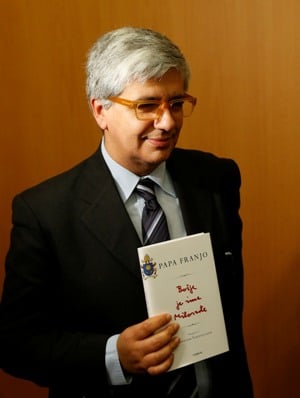
The Name of God is Mercy is the title of the book released last week by Pope Francis.
It is not so much a book as it is a book-length interview with the Holy Father, conducted by Italian journalist Andrea Tornielli.
Despite anticipatory murmurings that this book would provide clues into the Holy Father’s intentions regarding the receiving of Communion by those who are divorced and civilly remarried, the interviewer makes it clear at the beginning of the text that the book is not about that.
Tornielli was “not concerned with getting a few punchy phrases that might become part of the media debate around the Synod on the Family” but rather wanted to reveal the heart of Pope Francis, giving him the space to open another “door” in this Jubilee Year.
And we receive exactly that: Pope Francis’ understanding and experience of mercy, which he names as God’s strongest message.
I don’t want to give too much away about the text, because I really hope you will read it. Instead, I will just draw out a couple of things which really struck me.
The first is Pope Francis telling us that mercy does not erase sin. He explains that it is God’s forgiveness which erases the sin, and mercy is the way in which He forgives us. We see this in the Gospels, where Jesus forgives not simply with a declaration, but with a personal encounter.
We also see it in the Church, with this same personal encounter, this forgiveness-by-way-of-mercy, is repeated in the Sacrament of Confession. The pope is teaching us not just about the virtue of mercy, but about the quality of mercy; that mercy is not just what we need to be doing, but how we need to be doing it.
It means that the works of mercy are more than just about feeding the hungry, clothing the naked and sheltering the homeless, but the way in which we feed, clothe and house them.
These acts of mercy involve an encounter which brings Christ (as well as basic necessities) to the recipient. The same is true for the spiritual works of mercy.
The other thing which stands out is the pope’s reflection on Jesus’ healing of the leper.
Pope Francis explains that because lepers were excluded from the community, they bore the pain of isolation and marginalisation in addition to their illness, and that the purpose of this exclusion was to protect the healthy.
Pope Francis says that we sometimes deal with the sins of others in the same way. Instead of reaching out to them, we try to protect ourselves from the contamination which might occur if we get too close.
But Jesus, Who is purity itself, touched the “unclean” leper to heal him. “He didn’t sit down at a desk and study the situation, He didn’t consult the experts for pros and cons,” Pope Francis said.
“What really mattered to Him was reaching stranded people and saving them.”
The pope said that this action was shocking in those times and acknowledged that it is also shocking now, but says that the example we are given is to “enter into contact” with those who suffer physically and spiritually.
Early last year, Pope Francis invited Diego Neria Lejárraga, who was born female but underwent gender reassignment surgery at age 41, to meet him at his Domus Sanctæ Marthæ home.
This followed the pope receiving a letter from Diego, telling him of the rejection he received in his parish after the surgery.
No details were issued about the meeting, except that Diego told a local newspaper that he asked the pope whether there was even “a corner of the Church” where he could belong following the surgery.
Pope Francis responded by embracing him. Like Jesus embracing the leper, the pope did not first sit down and consider whether or how such an embrace would create confusion about the Church’s teaching on gender reassignment.
My guess is that he was focused not on the other 99, but on the singular lost sheep before him.
If I’m being honest, the lawyer in me would prefer that things like this didn’t happen, because lawyers are conditioned to avoid any ambiguity (that’s why we use so many words!).
And the communicator in me would prefer that public acts (or private acts which may end up being public) would be enveloped in a little more clarity. But maybe in this Year of Mercy, I need to be more like Pope Francis.
Maybe I need to spend more time embracing others without being concerned about whether my embrace might only convey the “neither do I condemn you” half of the message without the important “go, and sin no more” as well.
The book is a worthy read. After reading it, I’m convinced the Year of Mercy will be more a Year of Conversion than a Year of Fluffiness.
The book is not a political statement; it’s part examination of conscience, part reminder from the Vicar of Christ of the tender mercy of God.
